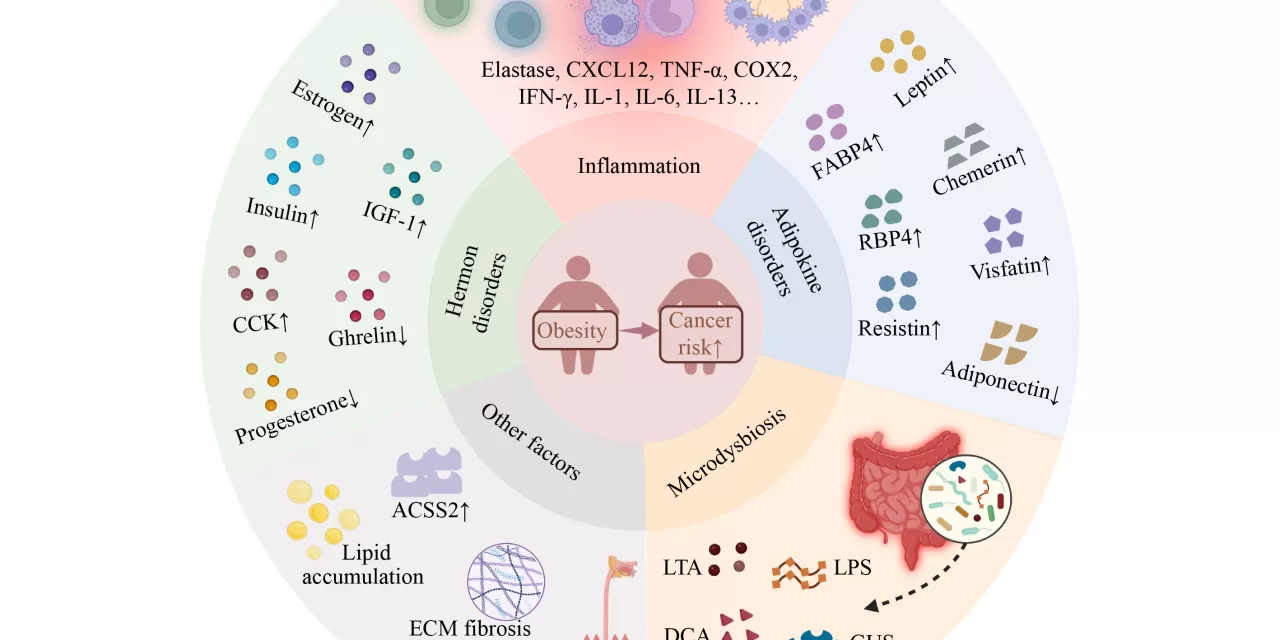Obesity, a complex and escalating health issue worldwide, has long been associated with a heightened risk of various cancers. A recent comprehensive review published in Frontiers of Medicine sheds light on the intricate mechanisms that link obesity to cancer risk and discusses potential clinical implications.
Experts have identified several key mechanisms through which obesity contributes to cancer development, including inflammation, hormonal imbalances, gut microbiota dysregulation, and adipokine level disruptions. Chronic low-grade inflammation in adipose tissue—marked by increased infiltration of proinflammatory immune cells and the release of cytokines—emerges as a significant contributor to carcinogenesis in obese individuals.
Hormonal disturbances are another critical factor. Elevated estrogen levels, especially in postmenopausal women, have been linked to the development of obesity-related cancers. The gut microbiota, which is often dysregulated in individuals with obesity, also plays a role in promoting inflammation and enhancing the process of carcinogenesis.
Adipose tissue, known to function as an active endocrine organ, secretes adipokines such as leptin and adiponectin. These molecules can either promote or inhibit cancer growth depending on their levels, which are frequently altered in obesity. Additionally, physical stimuli such as increased abdominal pressure and interstitial fibrosis contribute to the increased cancer risk associated with obesity.
The review also emphasizes prevention strategies for reducing the risk of obesity-related cancers. Weight management, achieved through dietary changes, physical activity, bariatric surgery, and pharmacotherapy, is crucial in mitigating cancer risk.
Dietary modifications, such as adopting low-fat, low-carbohydrate, or Mediterranean diets, have been shown to reduce cancer risk by alleviating inflammation and oxidative stress. Regular physical activity plays an essential role in normalizing immune metabolism, thereby reducing chronic inflammation and lowering cancer risk in obese individuals.
Bariatric surgery has emerged as a particularly effective intervention, with studies demonstrating a significant reduction in cancer incidence after weight loss surgery. For those unable to undergo surgery, pharmacological interventions—ranging from weight loss medications to drugs targeting oncogenic pathways—offer a promising non-surgical approach to preventing obesity-related cancers.
The review concludes with a call for further research into the mechanisms linking obesity and cancer. It raises important questions about the differential effects of acquired versus hereditary obesity on cancer risk, the role of aging in these processes, and the potential vicious cycle between worsening obesity, gut microbiota dysbiosis, and cancer promotion.
As the global obesity crisis continues to grow, understanding the complex interactions between obesity and cancer is crucial for developing personalized prevention and treatment strategies. Experts urge continued investigation into this pressing health issue, highlighting the need for more research to evaluate the effectiveness of various intervention strategies in reducing the risk of obesity-related cancers.
For more information, refer to Xiaoye Shi et al’s article, Novel perspectives on the link between obesity and cancer risk: from mechanisms to clinical implications, published in Frontiers of Medicine (2024). DOI: 10.1007/s11684-024-1094-2.












